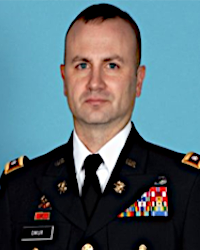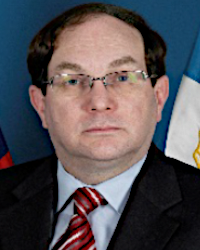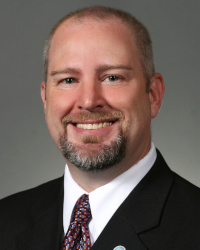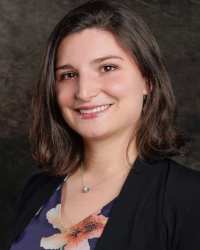Speakers
 Casey Babb
Casey BabbAssociate Fellow, Royal United Services Institute
Senior Analyst, Public Safety Canada
Babb is a Ph.D. candidate at the Norman Paterson School of International Affairs at Carleton University in Ottawa. His doctoral research focuses on the ways in which different authoritarian regimes vary in their use of cyber attacks. Over the last number of years, he has also undertaken extensive research on the nexus between artificial intelligence and national security, cyber conflict, weaponising outer space, and the impact emerging technologies are having on great power competition and warfare. He holds degrees in political science and international development (B.A.) from Saint Mary’s University, as well as in international relations (M.A.) from York University.
 John Comiskey, Ed.D.
John Comiskey, Ed.D.Associate Professor, Homeland Security, Monmouth University
Comiskey teaches undergraduate and graduate courses in homeland security, intelligence, terrorism, climate security, and mass shootings. His research interests include homeland security intelligence, cyber security, mass shootings, and climate security. He is the co-editor of Theoretical Foundations of Homeland Security and has published peer-reviewed journal articles in the Homeland Security Affairs, Journal of Homeland Security Education, Journal of Human Security and Resilience, Disaster Journal, and Behavioral & Social Science Librarian journals as well as several U.S. government white papers. He is also the editor of the Journal of Security, Intelligence, and Preparedness Education. Comiskey is a retired New York City Police lieutenant and a retired U.S. Coast Guard Reserve senior chief petty officer. His professional experiences include law enforcement, intelligence, counterterrorism, and event and crisis management. Comiskey was a first-responder to both the 1993 and 2001 World Trade Center bombings and returned to active duty during Operation Iraqi Freedom.
 Michael Larranaga
Michael LarranagaPresident, R.E.M. Risk Consultants
Larranaga is an expert in risk management, business continuity, operational excellence, and process safety. He serves as an appointed member of the Scientific/Technical Advisory Committee of the World Trade Center Health Program of the Centers for Disease Control and Prevention (CDC) and the Department of Homeland Security (DHS) Opioid Working Group. He previously served as an appointed public member on the Board of Scientific Counselors for the CDC’s National Institute for Occupational Safety and Health and the DHS First Responders Group.
 Cameron Carlson, Ph.D., PMP
Cameron Carlson, Ph.D., PMPProgram Director, Homeland Security and Emergency Management, University of Alaska Fairbanks
Director, Center for Arctic Security and Resilience, University of Alaska Fairbanks
As the director of the Homeland Security and Emergency Management program for the past ten years, Carlson has focused on redefining homeland defense, security and emergency management education and in developing collaborative working relationships with other programs within the United States and abroad to better meet the needs of the diverse student populations across the spectrum of these fields. He currently serves as the project lead and principle investigator for the Arctic Defense Security Orientation project for USNORTHCOM and U.S. Alaska Command and is working to integrate interdisciplinary research and academic activities to focus on areas such as geospatial intelligence integration, climate security and resilience and human security within the Arctic region.
 Richard Berkebile, Ph.D.
Richard Berkebile, Ph.D.Associate Professor, Joint, Interagency and Multinational Operations, U.S. Army Command and General Staff College
Berkebile's professional interests include homeland defense and security, protection, terrorism, and civil war. Berkebile is a retired Air Force officer and served in a variety of assignments in the United States, Germany, and Korea. He holds a Ph.D. in Political Science from the University of Missouri, a M.S. in International Relations from Troy University, and a B.S. in International Affairs from the U.S. Air Force Academy.
 Andrea Charron, Ph.D.
Andrea Charron, Ph.D.Associate Professor, University of Manitoba
Director, Centre for Defence and Security Studies, University of Manitoba
Charron holds a Ph.D. from the Royal Military College of Canada. She obtained an M.A. in International Relations from Webster University, Leiden, The Netherlands, an M.P.A. from Dalhousie University and a B.S. (Honours) from Queen's University. Charron worked for various federal departments including the Privy Council Office in the Security and Intelligence Secretariat. She completed her post doctorate at Carleton's Norman Paterson School of International Affairs. Charron has written extensively on the Arctic, NORAD, Canadian defence policy and the Security Council. She is a member of the Department of National Defence’s Advisory Board and is asked regularly to provide guest lectures at Canadian Forces College and to provide testimony to Senate and House of Commons' committees.
 James Fergusson, Ph.D.
James Fergusson, Ph.D.Professor, Political Studies, University of Manitoba
Deputy Director, Centre for Defense and Security Studies, University of Manitoba
Fergusson received his B.A. (Honours) and M.A. degrees from the University of Manitoba, and his Ph.D. from the University of British Columbia. He teaches a range of courses in the areas of international relations, foreign and defence policy, and strategic studies. He has published numerous articles on strategic studies, non-proliferation and arms control, the defenceindustry, and Canadian foreign and defence policy.
 Nancy Teeple, Ph.D.
Nancy Teeple, Ph.D.Postdoctoral Fellow, National Defence MINDS, North American and Arctic Defence and Security Network
Adjunct Assistant Professor and Research Associate, Royal Military College of Canada
Teeple's research areas are nuclear strategy and deterrence, missile defence, arms control, and Arctic security. She holds a Ph.D. in Political Science from Simon Fraser University, an M.A. in War Studies from Royal Military College, a M.L.I.S. from the University of Western Ontario, an M.A. in Ancient Studies from the University of Toronto, and a B.A. (Honours) in Classical Studies from the University of Ottawa. Teeple recently held the 2019-2020 Fulbright Canada Research Chair in Peace and War Studies at Norwich University in Vermont where she explored the causal processes in the formulation of U.S. Arctic security and defence policy, within the context of the Canada-U.S. continental defence relationship.
 Ali Omur, Lt. Col., U.S. Army
Ali Omur, Lt. Col., U.S. ArmyStaff Group Advisor and Instructor, Joint, International and Multinational Operations, U.S. Army Command and General Staff School
Omur is a graduate of Florida State University and was commissioned in the quartermaster corps in 1994. He has numerous deployments to the Bosnia, Turkey, Kuwait and Afghanistan theaters. Upon promoting to lieutenant colonel in 2011, Omur was assigned as the Eastern Europe and Eurasia branch chief, Security Cooperation Division, G-3, U.S. Army Europe Headquarters in Heidelberg, Germany. He then deployed again for his second Afghanistan tour as an AfPak Hand in 2013 to Kabul, Afghanistan to serve as a strategic advisor to Commander of International Security Assistance Force, Commander’s Action Group, International Security Assistance Force Headquarters. After redeploying to Germany he served as the Security Cooperation Division, G-3, U.S. Army Europe Headquarters acting deputy division chief. From 2014 to 2016, he attended Johns Hopkins University School of Advanced International Studies in Washington, D.C., earning a M.I.P.P .degree. From 2016 to 2019, he served as the U.S. Army Attaché to the Kingdom of Denmark in Copenhagen.
 Troy Bouffard, Master Sgt. (Ret.), U.S. Army
Troy Bouffard, Master Sgt. (Ret.), U.S. ArmyAssistant Director, Center for Arctic Security and Resilience, University of Alaska Fairbanks
Bouffard has a B.A. in Political Science and M.A. in Arctic Policy. He is currently working on a Ph.D. with a focus on Russian Arctic defense strategy and international law. He is co-principle investigator of the DoD Arctic Defense and Security Orientation program with USNORTHCOM and U.S. Alaskan Command. He is a network coordinator for the North American and Arctic Defence and Security Network and a non-resident research fellow with the Centre for Defence and Security Studies at the University of Manitoba. He has co-authored numerous articles, most recently with the Canadian Global Affairs Institute, Vanguard Magazine, and the Canadian Naval Review. Among his other academic activities, he recently served as a contracted supervisor and chief editor for a NATO Arctic research project. Other activities include delegate experience with the Arctic Council, panel and conference presentations, and conduct of many inter/national Arctic events.
 Glenn Jones, Ph.D.
Glenn Jones, Ph.D.Senior Team Leader, Joint and Combined Warfighting School, Joint Forces Staff College, National Defense University
Jones graduated from Christopher Newport College in 1983 with a B.A. in History and Political Science. A distinguished military graduate, he served in the Army for 25 years, retiring in 2008 as a lieutenant colonel. His assignments include: Fort Bragg, U.S. Atlantic Command, Camp Casey Korea, Fort Leavenworth, Fort Carson, and U.S. Central Command. He joined the faculty at Joint Forces Staff College in 2003 and has taught in the Joint and Combined Warfighting School (2003 to 2009), the Homeland Security Planner’s Course (2009 to 2014), and served as the associate dean of academics (2014 to 2017) before returning to the classroom. A 2008 recipient of the Recognition of Excellence Award and designated as "master faculty," he received an M.A. in National Security and Strategic Studies from the Naval War College, and subsequently completed his Ph.D. in Public Safety with a specialization in Emergency Management and a Homeland Security concentration in 2016.
 James Redick
James RedickDirector, Emergency Preparedness & Response, City of Norfolk, Virginia
Redick is a certified emergency manager with the International Association of Emergency Managers. His accomplishments include the 2012 Virginia Emergency Management Professional of the Year, the 2016 International Association of Emergency Manager's Clayton R. Christopher Award, and the 2017 Virginia Stanley Everett Crigger Humanitarian Achievement Award. Redick is chair of the Team Norfolk Emergency Operations. He was appointed to a third consecutive term on the Virginia Governor's Secure and Resilient Commonwealth Panel where he co-chaired with Senator John Watkins a sub-panel focused on the high probability and impact threat of recurrent flooding and sea level rise. He was also selected to serve on the Governor's Task Force on Public Safety Preparedness and Response in 2017. Redick is a graduate of FEMA's Advanced Academy and the Naval Postgraduate School's Center of Homeland Defense and Security Executive Leadership Program. He holds a B.A. in Organizational Leadership and Management from Regent University and a M.P.A. from Old Dominion University.
 Dongwon Lee, Ph.D.
Dongwon Lee, Ph.D.
Associate Professor, Penn State University
Lee has a Ph.D. in Computer Science from University of California, Los Angeles and is distinguished member of the Association for Computer Machinery, being elected in 2019. Prior to starting at Penn State, he has worked at AT&T Bell Labs.. From 2015 to 2017, he has served as a program director at the National Science Foundation, co-managing cybersecurity programs with a yearly budget of $55 million. In general, he researches the problems in the areas of data science, machine learning, and cybersecurity. Since 2016, in particular, he has led a project at Penn State, investigating computational means to better understand and combat fake news.
Topic: Fake News 2.0: Combatting Neural False Information
Binyam Solomon
Senior Defense Scientist, Defense Research and Development Canada
Adjunct Research Professor, Carleton University
Prior to his work at Defense Research and Development Canada, Solomon held appointments as chief economist at the Department of National Defence, acting chief scientist at the Centre for Operational Research and Analysis, and special advisor to the deputy parliamentary budget officer. He has been published extensively in economics, statistics and defence topics. His research interests include political economy, aspects of national security, peacekeeping economics, and time series methods. Solomon holds a M.A. in Economics from the University of Ottawa and a Ph.D. in Defence Economics from the University of York, United Kingdom.
 Marion Agier
Marion Agier2020 Graduate, Norman Paterson School of International Affairs, Carleton University
Agier holds a M.A. in International Affairs from Carleton University's Norman Paterson School of International Affairs. She is currently a policy analyst at the Canada School of Public Service, as part of the National Security Learning Program. She previously worked at the Treasury Board Secretariat in the cyber security policy team and the Department of National Defence in the directorate of naval strategy. Agier served in the Royal Canadian Navy as a naval warfare officer and completed her military formation at the Royal Military College of Canada.
 Eliana Taylor
Eliana Taylor2020 Graduate, Bush School of Government and Public Service, Texas A&M
Taylor has a Masters of International Affairs from the Bush School of Government and Public Service at Texas A&M University. Her research passion is for Arctic and the intersectionality between international policy and United States national security in the region. She is currently pursuing a career as an independent business owner, while pursuing opportunities to further explore the Arctic and promote the growing research in the region.
 Petro Voyatzakis
Petro VoyatzakisGraduate Student, Concordia University
Voyatzakis is a graduate student majoring in public policy and public administration at Concordia University in Montreal, Canada. His research interests include the intersection between Canadian strategic objectives and public policy making.
 Attila Arslaner
Attila Arslaner
Undergraduate Student, Concordia University
Arslaner is an undergraduate student majoring in political science at Concordia University in Montreal, Canada. His research interests revolve around the impact of emerging technologies to the security environment, and in particular to arms control.
Disclaimer: Material and external links contained herein are made available for the purpose of peer review and discussion.The thoughts and opinions expressed in the papers are those of the authors and do not necessarily reflect the official policy or position of NORAD and USNORTHCOM, the Department of Defense, or the U.S. Government.